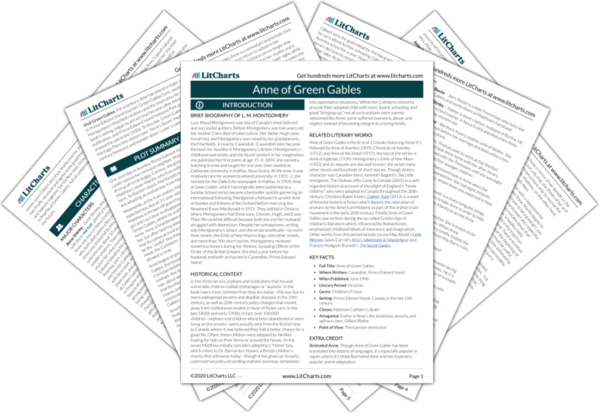Though romance and courtship don’t occupy a large role in Anne of Green Gables, boys remain an ongoing source of curiosity, fun, and occasionally torment for Anne and her friends at Avonlea school. Anne’s imaginations about romance usually take the form of grand passions fraught with danger and tragedy; her firsthand experiences, however, contrast with this overblown reality. This is especially the case with her enemy, Gilbert Blythe, whom she meets when he humiliates her in front of the whole school. Despite Anne’s resulting grudge, Gilbert spends the next few years being kind to her until Anne gradually softens and comes to appreciate and even care for Gilbert. Through her portrayal of Anne and Gilbert’s conflicted relationship, Montgomery suggests that romance is not typically a matter of grand passion, but rather something that develops in gradual, even unlikely ways.
At first, Anne idealizes romance as grand passion. When Anne arrives at Avonlea school, romance is an undercurrent of student life—students teasingly writing boys’ and girls’ names together on the porch, hearing rumors of friends’ older sisters having “beaus” and even getting married—but it all remains distant and abstract for Anne. Her naïve view of romance is exemplified by the romantic plots of her early story-writing efforts, like “The Jealous Rival,” in which a girl murders a romantic rival, only to be driven insane when she watches the man she loves jump to his own death. Anne even tells Diana that in researching this story, she asked her friend Ruby what her older sister’s marriage proposal was like, but decided that reality was insufficiently romantic, so she embellished it for her story. Anne’s fictional exaggerations of romance show that she stubbornly hangs onto a notion of romance as grand passion even when it doesn’t seem to match everyday experience.
Gilbert Blythe, however, punctures Anne’s idealization of romance. When they first meet, Anne thinks Gilbert is handsome, but Gilbert, who’s known for teasing girls he likes, tugs Anne’s braid in front of everyone and compares its color to “Carrots!” Because her hair color is Anne’s greatest shame in life, she immediately breaks her slate over Gilbert’s head in rage. When she’s unjustly punished for the entire incident, she ruthlessly holds it against Gilbert, vowing never to forgive or speak to him, even when he genuinely apologizes. Anne’s relationship with Gilbert quickly shows her that her idealizations of relationships between boys and girls don’t hold up to reality—in fact, affection can be expressed in infuriating and alienating ways.
Though Gilbert remains fond of Anne, Anne’s stubborn grudge persists for years, even when Gilbert goes out of his way to show kindness. While acting out a romantic scene from a Tennyson poem, Anne gets stranded in the pond and Gilbert rescues her from drowning. When Gilbert takes the opportunity to apologize for his old joke again and offer friendship, Anne “had an odd, newly awakened consciousness under all her outraged dignity that the half-shy, half-eager expression in Gilbert’s hazel eyes was something that was very good to see. […] But the bitterness of her old grievance promptly stiffened up her wavering determination.” Anne is beginning to notice that Gilbert is attractive and to enjoy the fact that he evidently likes her, yet she buries these new feelings underneath her old grudge. Again, Anne’s playacting at romance is rudely and humorously undercut by the reality that romance isn’t typically the stuff of poetic legend, but of real, often conflicted relationships.
In the end, the foundation of Anne’s and Gilbert’s romance is established through friendship, not passion. After years of academic rivalry, Gilbert demonstrates his continued regard for Anne by giving up the teaching post at Avonlea school so that she can have it, though he has no expectation of reward. In fact, though Gilbert tries to dodge Anne, assuming she’ll still hate him, she unexpectedly extends kindness for the first time: “I forgave you that day by the pond landing, although I didn’t know it. What a stubborn little goose I was.” “We were born to be good friends, Anne. You’ve thwarted destiny long enough,” Gilbert happily tells her in reply. After years of teasing, hostility, and rivalry, Anne’s resistance to Gilbert is broken not by a grand, romantic gesture, but by a quietly sacrificial act that makes Anne realize how groundless and self-defeating her attitude toward him has been.
Though Anne and Gilbert don’t begin an overt romance in this book, events at the end of the novel hint at the courtship and marriage that take place in later Anne novels. Marilla reveals to Anne that she once cared for Gilbert’s father John, but that a foolish quarrel thwarted their promising romance. Not long after that, Marilla teases Anne about her lingering conversation with Gilbert by Green Gables’ gate, suggesting that Anne’s and Gilbert’s long interest in one another—begun in hostility and finally blossoming into friendship—is fated to ripen into romance. Far from being a grand passion, Anne’s and Gilbert’s relationship undercuts Anne’s dramatic notions in every way, but Montgomery suggests that it has the makings of a more real and enduring love than a passionate, idealized romance could offer.
Boys and Romance ThemeTracker

Boys and Romance Quotes in Anne of Green Gables
For a moment Anne hesitated. She had an odd, newly awakened consciousness under all her outraged dignity that the half-shy, half-eager expression in Gilbert's hazel eyes was something that was very good to see. Her heart gave a quick, unfamiliar little beat. But the bitterness of her old grievance promptly stiffened up her wavering determination. That scene of two years before flashed back into her recollection as vividly as if it had taken place yesterday.

Unlock explanations and citation info for this and every other Anne of Green Gables quote.
Plus so much more...
Get LitCharts A+








